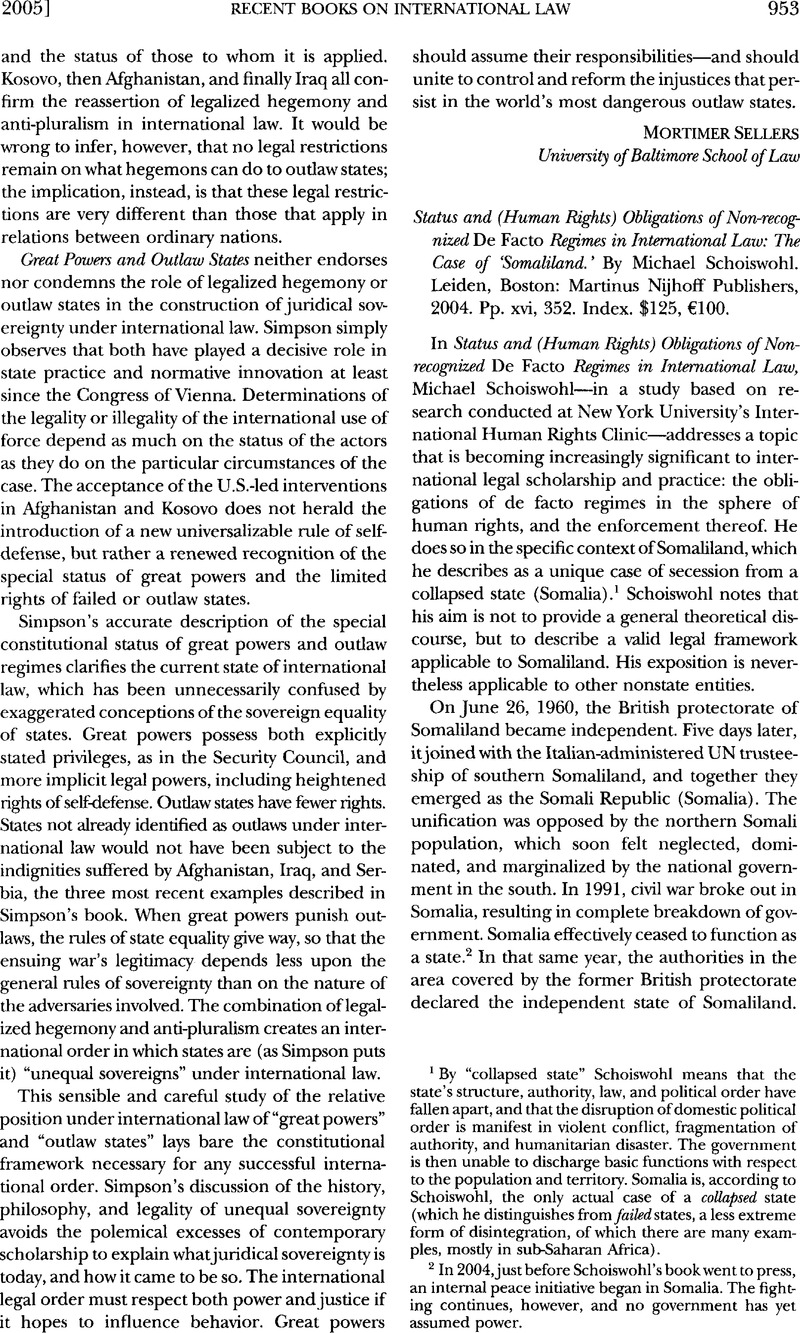Published online by Cambridge University Press: 27 February 2017

1 By “collapsed state” Schoiswohl means that the state’s structure, authority, law, and political order have fallen apart, and that the disruption of domestic political order is manifest in violent conflict, fragmentation of authority, and humanitarian disaster. The government is then unable to discharge basic functions with respect to the population and territory. Somalia is, according to Schoiswohl, the only actual case of a collapsed state (which he distinguishes from failed states, a less extreme form of disintegration, of which there are many examples, mostly in sub-Saharan Africa).
2 In 2004,just before Schoiswohl’s book went to press, an internal peace initiative began in Somalia. The fighting continues, however, and no government has yet assumed power.
3 Schoiswohl’s definition largely corresponds to the traditional definition of a state as reflected in the Convention on the Rights and Duties of States, Dec. 26, 1933, 165 LNTS 19, reprinted in28 AJIL Supp. 75 (1934), Article 1 of which provides:
The state as a person of international law should possess the following qualifications:
(a) a permanent population;
(b) a defined territory;
(c) government; and
(d) capacity to enter into relations with the other states.
4 For example, the international responses to Ian Smith’s regime in southern Rhodesia, SC Res. 216 (Nov. 12, 1965), and to the creation of the Turkish Republic of Northern Cyprus, SC Res. 541 (Nov. 18, 1983).
5 For example, with regard to the Western bloc’s refusal to recognize the German Democratic Republic until the early 1970s.
6 Even then, the statehood of the nonrecognized entity remains opposable to the nonrecognizing state. Crawford, James, The Creation of States in International Law 20 (1979)Google Scholar.
7 Id.
8 James, L. Brierly, The Law of Nations 139 (Waldock, Humphrey ed., 6th ed. 1963).Google Scholar
9 The same could be said for Congo, later Zaire, today the Democratic Republic of the Congo. Crawford, supra note 6, at 42-43.
10 Surprisingly, however, he does not consider its impact on statehood.
11 Reference re Secession of Quebec, [1998] 2 SCR 217 (Can.); Loizidou v. Turkey, 1996-VI Eur. Ct. H.R. 2216, 2241 (concurring opinion of Wildehaber and Ryssdal.JJ.).
12 Lauterpacht, Hersch, Recognition in International Law (1947).Google Scholar
13 Since Schoiswohl’s analysis relies heavily on the law applicable to nonstate actors involved in armed conflict, much of it concerns international humanitarian law and not international human rights law.
14 Rules of Procedure and Evidence of the International Criminal Tribunal for the Former Yugoslavia, Rule 2, at <http://www.un.org/icty/> (definition of “state”).
15 Kadic v. Karadzic, 70 F.3d 232 (2d Cir. 1995). This judgment preceded the Dayton Accords, which gave the Republika Srpska a formal status.
16 Agreement on Human Rights, July 26, 1990, El Sal.-Frente Farabundo Martí para la Liberación Nacional, in UN Doc. S/21541 (1990).
17 Comprehensive Agreement on Human Rights, Mar. 29, 1994, Guat.-Guatemalan National Revolutionary Union, 36 ILM 276 (1997).
18 Surprisingly, he fails to examine whether declarations of undertaking have been made under Article 96(3) of Additional Protocol I to the 1949 Geneva Conventions, which specifically provides for such a step and attaches binding legal consequences to it.
19 See, e.g., Declaration of Minimum Humanitarian Standards at Turku/Abo (1990), in Asbjørn, Eide, Rosas, Allan, & Meron, Theodor, Combating Lawlessness in Gray Zone Conflicts Through Minimum Humanitarian Standards, 89 AJIL 215, 219 (1995).Google Scholar
20 Articles on the Responsibility of States for Internationally Wrongful Acts, Art. 10, Report of the International Law Commission on the Work of Its Fifty-third Session, UN GAOR, 56th Sess., Supp. No. 10, at 43, UN Doc. A/56/10 (2001), available at <http://www.un.org/law/ilc>, reprinted in Crawford, supra note 6.
21 Hugo Grotius, De Jure Belli Ac Pacis §1.4.15, quoted in Madzimbamuto v. Lardner-Burke, [1969] 1 App. Cas. 645, 728-29 (P.C. 1968).
22 Cf. Madzimbamuto v. Lardner-Burke.
23 See, e.g., Texas v. White, 74 U.S. 700, 732 (1868); Hesperides Hotels Ltd. v. Aegean Turkish Holidays Ltd., 1978 Q.B. 205; Sokoloff v. Nat’l City Bank of New York, 239 N.Y. 158 (1924).
24 In 2001 the European Court of Human Rights recognized the courts of the de facto regime of the “Turkish Republic of Northern Cyprus” as domestic remedies to be exhausted before recourse to the European Court is permitted. Cyprus v. Turkey, 35 Eur. H.R. Rep. 35 (2002) (fourth interstate application). The goal was specifically to widen the guarantees of human rights for individuals living under a de facto regime. This recognition could be said to apply to the Turkish Republic of Northern Cyprus not directly as a de facto regime, but as a subordinate administration under Turkish occupation. Occupying powers (although Turkey was not formally designated as one) are also a recognized category of legal persons under international law.